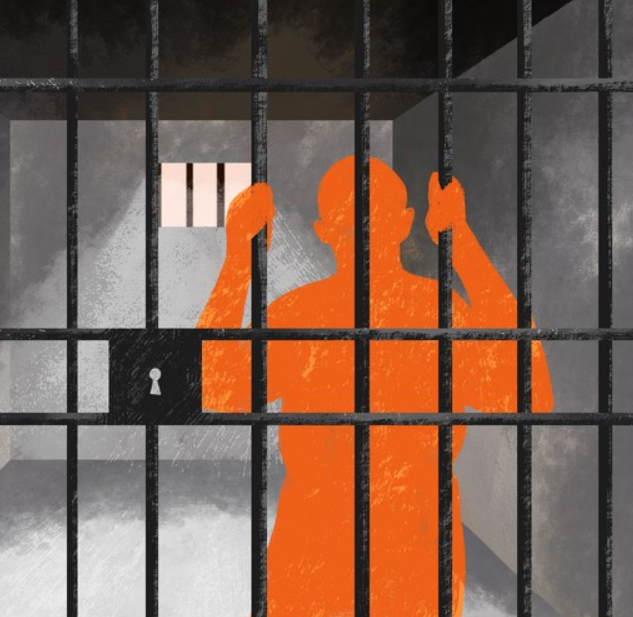There are about 60,000 people in remand detention across the country. Illustration: Lisa Nelson
By Liezl Human
- Nationally, about 60,000 detainees who have not been sentenced are being held in South Africa’s overcrowded prisons, up from 49,000 in 2021. About 5,000 have been waiting for a trial for over two years.
- On Tuesday the Department of Justice and Constitutional Development and the South African Law Reform Commission briefed Parliament’s portfolio committee for correctional services on what it plans to do.
- Various amendments to the Criminal Procedure Act have been proposed.
Amendments to the Criminal Procedure Act (CPA) seek to address the high number of detainees who have not been sentenced languishing in South Africa’s prisons. Thousands of people awaiting trial spend more than two years in overcrowded prisons, often because they cannot afford to pay bail.
GroundUp previously reported how the issue of remand detainees is a priority for the Bail Fund, a pilot project led by the Judicial Inspectorate for Correctional Services (JICS), which aims to help detainees who cannot afford bail amounts under R1,000.
On Tuesday, the Department of Justice and Constitutional Development (DOJ) and the South African Law Reform Commission (SALRC) briefed Parliament’s portfolio committee for correctional services.
The Deputy Director-General of Court Administration in the DOJ, Lucky Charles Mohalaba, noted that there are about 60,000 people in remand detention across the country. About 26,000 have been in detention for less than three months. But about 5,000 have been awaiting trial for over two years.
A small number of people have been in remand detention for a concerning number of years, some up to and even longer than ten years. There are 430 remand detainees who have been in prison without being sentenced for five to seven years, 57 who have been in prison for seven to ten years, and five people who have been in prison for ten to 15 years.
Mohalaba acknowledged that the number of remand detainees is high, and it has increased over the past few years, from nearly 49,000 in 2021.
Mohalaba said the issue is discussed at provincial efficiency enhancement committees (PEEC), chaired by each province’s judge president. Each has a sub-committee set up to intervene and look at cases where bail is less than R1,000. He said the Department of Correctional Services would provide names of all remand detainees.
Mohalaba said factors contributing to the delays in finalising these cases include accused people changing legal representatives, requests for case-related documents, multiple co-accuseds, delays in securing court dates, loss of court records, and the failure of witnesses to appear in court.
Fanyana Mdumbe, of the SALRC, briefed Parliament on recommended additions to the CPA, which once “promulgated as law by Parliament, would add to options that are currently available to the courts”.
While the CPA does have provisions for bail, the SALRC believes that “there is room for improvement”, such as the release on bail on the basis of indigence.
Mdumbe said amendments would include the release of an accused person facing fine-only offences without having to pay money. It also included alternative security for bail for people who do not have residential addresses, such as people who live in informal settlements, whose bail applications are often denied due to this.
The amendments would also empower the courts to look into the circumstances of a remand detainee and to make a determination on whether their remand conditions are reasonable.
Some MPs were critical of the number of remand detainees, the conditions they were detained in, overcrowding, and potential failure of the judiciary to address the increasing number of remand detainees.
DA MP Kabelo Kgobisa-Ngcaba questioned how many correctional facilities officials from the DOJ had visited. “I don’t think you have a full appreciation of the horror in our prisons. Is it justice for people to languish in those conditions when they are unsentenced?” she asked.
EFF MP Nontando Nolutshungu said, “We can have the best policies, but if they are not implemented properly, we are not going to get the results.”
Nolutshungu said that the remand detainee population increase over the past five years “shows a deeper failure in the justice system”.
DA MP Janho Engelbrecht was also critical of the judiciary, saying, “Their independence is crucial to our democracy, however, the judiciary’s independence cannot be a shield against accountability. Their decisions on sentencing bail and case backlogs directly cause prison overcrowding and undermine our rehabilitation mandate.”
The Minister of Justice Mmamoloko Kubayi noted that the CPA does not give powers to the minister but to the courts.
“The judiciary is independent and does not account to the executive. We are responsible for the administration and financial support for the judiciary and the NPA. But I’m not accountable to nor are we allowed to get involved in court matters and in how a judicial decision is taken,” said Kubayi.
“Our only option is through policies, legislation and regulations,” she said.
The minister also said in response that she has been prioritising infrastructure challenges in courts, and therefore has not visited a correctional facility.
She said the CPA amendments would be completed before the end of the financial year, March 2026.
Follow African Insider on Facebook, X and Instagram
Picture: GroundUp
For more African news, visit Africaninsider.com
Compiled by Betha Madhomu



